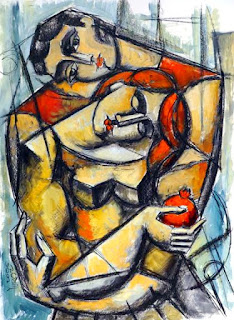Critical Theory has become increasingly important. This is theory which ‘reveals and challenges power structures’, which is oppression. It is ‘critical’ because it is not neutral. It is normative. Professor Robert M. Seiler of the University of Calgary writes that ‘criticism involves ... judgments for the purpose of bringing about positive change’.
I here propose that critical theory, in fact, goes back to the ancients, in its core characteristics—and to something both deeper and broader than we have supposed.
Socrates, in defining the virtuous life, said, ‘Choose the mean, and avoid the extremes on either side, as far as possible,’ while Aristotle thought of ethics as ‘the golden mean’—the balanced life. Thus ethics represents the achievement of balance in the human person—and, of course, in society. Balance between unity and diversity, novelty and tradition, thought and feeling, economy and community, and so much more. It is not hard to see how this coincides with critical theory—which seeks to bring balance to social inequalities of various kinds.
What is this balance, so beloved of the ancients? It stands to reason that, as we seek to balance all things, we have knowledge of those things. We are informed of them before we begin. In fact, if information is lacking, as we make judgements about our society, our resulting balance must be askew. While imbalances may come about simply through apathy, they may come about deliberately, too. In the case of lies, deceit, and propaganda, one simply removes information from the balance—or adds it. Or, worse, if one cannot get one’s way, one turns to violence and oppression, eliminating unwanted individuals, or seizing control of systems, to neutralise the information which is not wanted.
Oppression therefore rests on the suppression of information. Alternatively, it rests on the failure of an uptake of information. One may have systems which seem perfectly friendly towards all information, yet in practice fail to take it up. Information itself goes hand in hand with its reception, incorporation, and, of course, pursuant action.
This has three implications for critical theory.
• Firstly, where information is suppressed, this may not in every case happen along recognised class lines—or lines of race, gender, privilege, and so on. This is my first reservation concerning critical theory today. In reality, information is suppressed along all kinds of lines, which critical theory may fail to identify—because it fails to identify and analyse the suppression of information. It may miss oppression which we had not imagined, or which lies beyond familiar categories. This should not be understood as a rejection of critical theory. Rather, critical theory as we know it does not drive deep enough.
• Secondly, when one speaks in terms of the suppression of information, one broadens the scope of critical theory. One may also speak of such suppression—therefore oppression—in connection with the environment. Where we fail to include the environment in our thinking, we oppress wetlands, insects, elephants, forests, fish, and so much more. Critical theory today is not equal to such forms of oppression, precisely at a time where they threaten the ruination of our world. Again, this should not be understood as a rejection of critical theory. Far from it. Current critical theory, I maintain, does not go broad enough.
• Thirdly, critical theory has often been associated with ‘cancel culture’. The purpose here is not to discuss the merits or demerits of cancel culture, but to note that one should be careful that cancel culture does not limit the freedom of information. The loss of such information to the system could signal oppression.
Let us now notice: in terms of philosophical categories, my view goes down to bedrock. It goes down to the things-relations distinction, which originated with the ancient Greeks. This is a distinction which philosophers have accepted almost universally, among them Aristotle, Hume, and Wittgenstein—with some exceptions.* According to such philosophers, philosophy deals with things and the relations between them—at best, expansively and holistically. Therefore we oppose the suppression of information.
Oppression may now be defined as a loss of information to the system, through various kinds of pressure, including physical coercion. In short, this describes critical theory, which exposes oppression—yet more than critical theory, it goes to the very heart of reality, which is the relatedness of all things. It goes beyond human oppression, too, and includes our long and sorry oppression of the environment, where we failed to take into account all the information we should have done. I shall call this New Critical Theory.
An important exception is F.H. Bradley, perhaps the foremost philosopher of the 19th Century.

